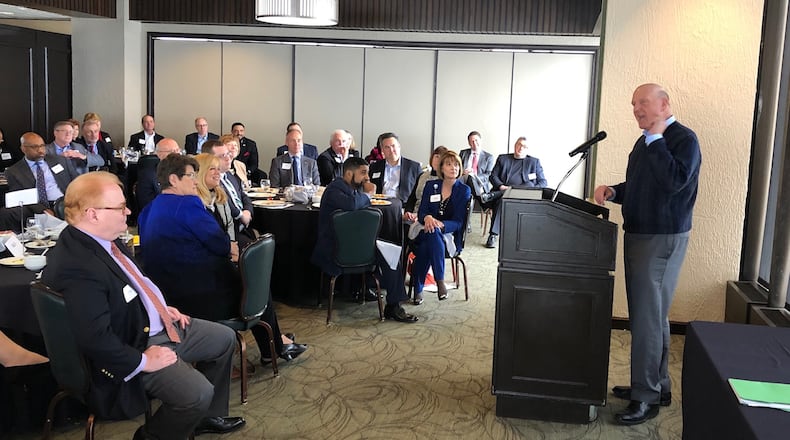RELATED: Grant to battle achievement gaps will help DPS, Northmont
“The general approach of cradle to career to me is the most smart, sensible thing in the world,” Ballmer said Tuesday at the Dayton Club downtown, referring to local collaborative efforts, from birth to college, to increase the number of students with marketable skills, credentials and degrees.
Dayton Mayor Nan Whaley shared new Census data Tuesday showing progress on that front. Whaley said the percentage of Montgomery County’s working-age adults who have at least an associate’s degree rose by more than 6 percentage points from 2010-17 – doubling the growth rate of Ohio and the nation.
“We must invest in our children. That’s the right thing to do,” Whaley said. “But it’s also the only way we’re going to be able to compete, as a community, a state and a country.”
Ballmer, 62, was CEO of Microsoft from 2000-14, owns the Los Angeles Clippers NBA basketball team and was listed by Forbes as one of the 20 richest people in the world. He and his wife Connie are touring cities that are working on cradle-to-career initiatives, having been in Milwaukee on Monday.
RELATED: Two Dayton education groups win national honors
“You need the leaders of the most important institutions, government and non-government, to really come together,” Ballmer said. “People have to say I’m in, and I’m going to spend some time on it, and I’m going to ask my people to spend some time. We’re going to take this work very seriously.”
The local commitment was obvious Tuesday, as the group gathered to hear Ballmer speak included state legislators, all three county commissioners, the state school superintendent, mayors and business executives. Ballmer praised the Dayton region’s collaboration, calling community support for efforts led by Learn to Earn Dayton “nothing short of phenomenal.”
Learn to Earn leaders admitted last year that progress on closing achievement gaps in kindergarten readiness, third-grade reading, graduation rates and more has been slower than they hoped. Ballmer cautioned that these issues, many rooted in problems in students’ home lives, won’t be fixed overnight.
“It does require patience and perseverance. … I encourage you to give early and give often and give patiently and with long-term commitment to the goals that are out there,” Ballmer said. “They are some of the only goals that I can imagine that are really important for society to invest back in. It’s not just about the kids. It’s about the future of our society.”
RELATED: Area wins $3.4M for after-school programs for needy kids
Ballmer, an energetic, emotional speaker, said he was nearly crying earlier Tuesday when his group visited the Small World Early Childhood Development Center in west Dayton, citing the blood, sweat and tears that the owners put into the center, plus the enthusiasm of the kids.
But he also cited the need to keep measuring the cold, hard data from local education efforts – a Learn to Earn strong point – so efforts can be adapted to what works. Montgomery County Commissioner Debbie Lieberman said it’s important to remember that those numbers, those data points, represent real children.
“We understand that leveraging our resources and targeting them to successful initiatives that serve our highest-need children is the only way to reverse the truly tragic trendlines that we’ve been seeing,” Lieberman said. “Those who don’t succeed are being consigned to struggle (as youth) and as adults. We see time and time again that those are the young people and adults who are in the criminal justice system.”
About the Author

